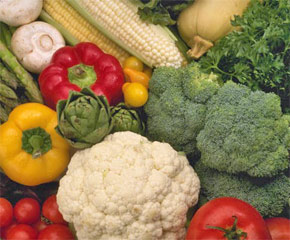What is organic?
Organic farming is nothing new. It’s simply a return to farming principles and techniques in use before the introduction of modern chemicals and farming methods.
Organic farming avoids the use of manufactured fertilisers, pesticides and another additives such as growth hormones and antibiotics. It also takes the environment into account by using farming techniques such as crop rotation.
Organic fruit and vegetables
Perhaps the most obvious advantage of organically produced fruit and vegetables is that they contain lower levels of pesticides and chemicals. But why are pesticides considered dangerous? So far there is limited evidence to prove a direct link between dietary pesticide and illness. Rather, pesticides may damage the plant itself, causing it to be less nutritious than plants not treated with pesticides. Organic produce has been found to have more ascorbic acid, which the body converts into vitamin C.
Organic meat
Organic meat is becoming more widely available in South Africa. Organic livestock farmers raise animals on organic feed, which is free of any genetic modification. Sick organic livestock may only be treated with permissible homeopathic remedies. No drugs, hormones, steroids, stimulants, antibiotics or other artificial substances may be used in the farming process. In conventional animal husbandry, antibiotics are used to treat and also promote growth. There has been concern about the effects of antibiotics on humans and fears that they reduce the body’s natural capacity to fight infection.
Organic or free range
It is important to note that organic animals are not necessarily the same free-range animals. All free-range animals live natural lives, roaming free, interacting with one another and eating only plant-based foods. The same goes for organic animals. The difference is that animals classified as free-range may be treated for conventional veterinary methods when sick. In addition, while free-range animals eat only plant-based foods, these are not necessarily organically produced and may include artificial additives.
Caring for the environment
Apart from the health benefits, many people choose organic because they are concerned about the impact of conventional farming methods on the earth. Organic farming builds soil fertility and minimises pollution and damage to the environment.
The problem with organic
If organic food were widely available and cost the same as conventionally produced food, most people wouldn’t hesitate to use it. But organically produced food is still only available at specific outlets and can be pricey.
In South Africa producing food organically is expensive and time-consuming. It’s more labour intensive and both the start-up and certification processes are expensive.
Organic or not?
Going organic is a mind-set and a way of life. Organic farming is better for the environment and has been shown to have added health benefits.
Some insist that organic food also tastes better. At the same time, conventional methods of farming are improving.
Fewer hormones and antibiotics are used and there is no conclusive evidence about the exact damage pesticides may
cause to humans.

